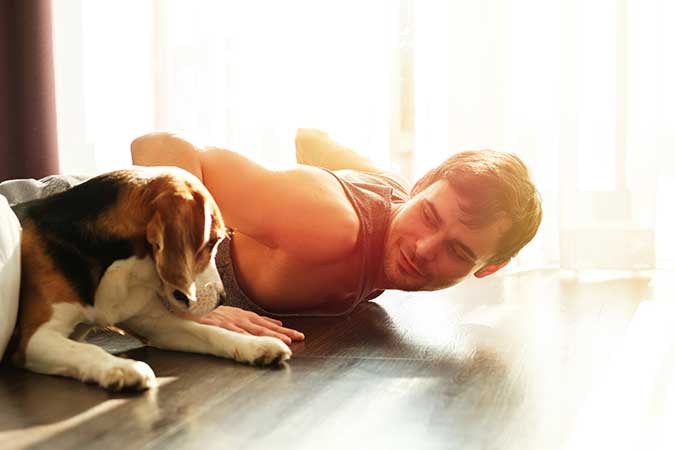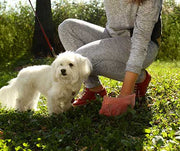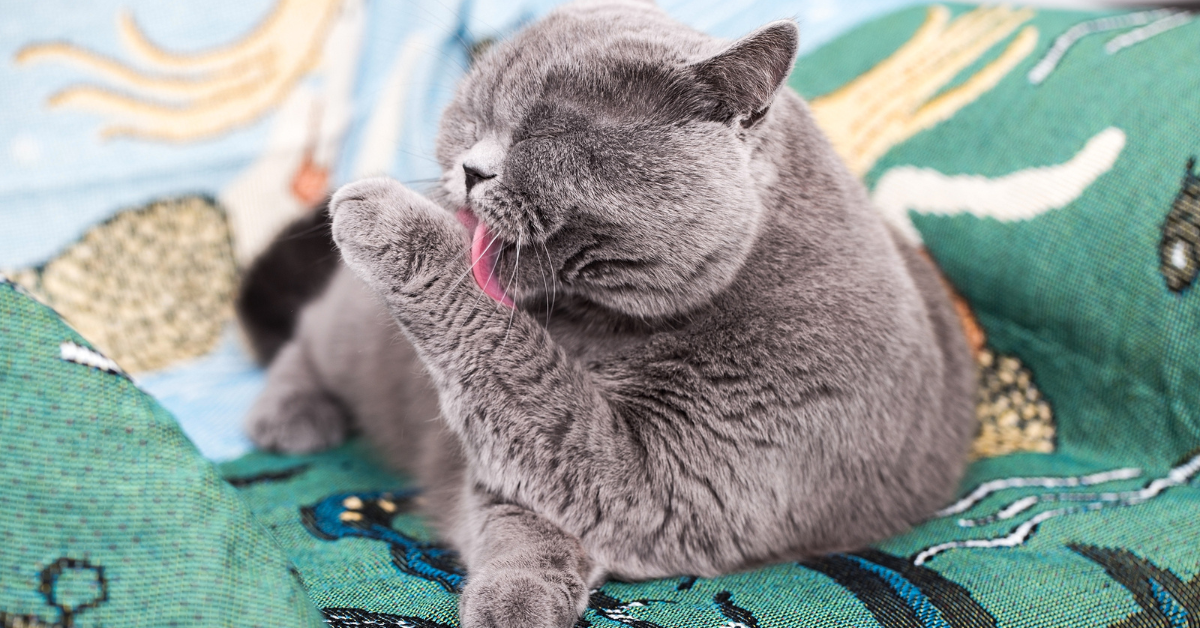How Much Exercise Does My Dog Need?

If you're a dog owner, you already know that your canine friend needs plenty of exercise to stay happy and healthy. But just how much exercise does your dog need, and how do you know if they're getting enough?
RISK OF NOT ENOUGH EXERCISE
Just like humans, dogs need to be exercising regularly to stay in shape and avoid becoming overweight. One in four dogs is obese, according to the American Society for the Prevention of Cruelty to Animals. As a result, this has been putting more dogs at risk of heart disease, diabetes, joint issues, and other serious medical problems.
Another risk that comes along with a lack of proper exercise is the development of behavioral problems. Do you ever notice yourself feeling antsy or crabby if you've spent too much time sitting in one place without being able to let out pent-up energy? Dogs can experience this too. They may start feeling frustrated and bored, which can result in excessive barking or even acting aggressively.
HOW MUCH EXERCISE IS ENOUGH?
This answer to the question above depends on the breed of dog you have as well as their age, size, and even, to an extent, their personality. Certain dogs may just be more prone to needing and wanting more exercise than others.
- Puppies: You probably already know that puppies have a lot of energy. However, their energy is different from adult dogs. Puppies do not have much stamina. Instead, they have small but intense bursts of energy. You may have seen this when your puppy suddenly starts zooming around the house (aka your puppy having "the zoomies"). The best way to exercise your puppy, then, is to play with them in short intervals of time, several times a day, rather than attempt to tire them out with one long walk.
-
Adult dogs: The amount of exercise your adult dog needs depends on its breed. Larger dog breeds such as shepherds and retrievers will require more exercise than toy breeds and brachycephalic dogs. However, some larger dogs, such as Great Danes, are less active while other small dogs might require more activity. if you have any questions about your specific dog, be sure to ask your vet and get their opinion on how much exercise they should be getting regularly.
Unlike puppies, most adult dogs have high stamina and do better with longer, steadier exercise. Regular walks and exercise lasting about 60 minutes per day are recommended on average. However, some adult dogs may need more while others need less. In addition to breed, some dogs may have medical conditions or health issues that you should be aware of so that you don't push your pup too hard while exercising. Again, ask your vet if you have any specific questions.
- Senior Dogs: As a dog gets older, they will slow down a bit. However, it's still important to give them plenty of exercise to avoid obesity and keep them mentally stimulated and happy. One good recommendation is giving your senior dog somewhere around 30-60 minutes of exercise per day but breaking it into smaller sections. This might consist of taking them for a walk in the morning and playing a game of fetch with them in the evening. Keep in mind that some senior dogs might not even be up for this much activity. If your dog has arthritis or stiff joints, they might not enjoy walking or playing games as much as they used to. Swimming can be a good alternative form of exercise. Just be sure you're supervising them and that they're comfortable in the water.
SIGNS YOUR DOG NEEDS MORE EXERCISE

Not sure if your dog is getting enough exercise? Sometimes there can be obvious signs, as stated earlier, of your dog seeming restless, more aggressive, or barking more often. You may also find your dog getting into things they shouldn't be or trying to initiate playtime. Maybe your pup is even up to trying to play while the rest of your household is asleep. These can all be signs that they need a little more activity.
However, it's often a matter of trial and error to see if your dog is getting enough of a workout regularly. Experiment with more exercise on some days or less on others. Are you noticing any differences? You may even want to change up what kind of exercise they're getting, regardless of if you've discovered how much they need. It's always a good idea to change things up now and then! Besides simply going for walks or playing fetch, take your dog with you on a hike! Or have them join you the next time you go for a bicycle ride. Find some other games to play with them that involve activity along with listening to and obeying commands. Mental stimulation is just as important as physical activity and giving them new things to do will keep them alert and curious about the world around them!
CONCLUSION
Remember that no matter what stage of life your dog is at, exercise is just as important to them as it is to humans. Make this a priority in their routine so that they can stay healthy in every aspect of their well-being.
Sources:
- https://www.akc.org/expert-advice/health/how-much-exercise-does-dog-need/
- https://www.rover.com/blog/much-exercise-dog-need/
- https://outdoordogadventures.com/2018/03/11/signs-a-dog-may-need-more-exercise/
- https://www.forbes.com/sites/nextavenue/2015/11/01/how-much-exercise-does-your-dog-really-need/?sh=3448174022e2
Previous article

Next article

Related posts
View all-

5 Simple Tips to Make Sure Your Cat Drinks Enough Water
Ensuring your cat stays hydrated is important, but it can be challenging since many cats don't drink enough water. Dehydration can lead to kidney disease and other health issues. Fortunately, you can encourage your cat to drink more with a few simple changes. Read Article -

How to Keep Your Cat Busy at Night (So You Can Sleep)
For many cat owners, the quest for a good night's sleep while keeping their feline friends content and engaged can seem like a never-ending battle. Cats, naturally more active at night or early in the morning, often disrupt your sleep schedules with nocturnal activity, whether through playful nature or seeking attention. Read Article -

Should You Bathe Your Cat? Everything You Need to Know About Cat Hygiene
When it comes to cat hygiene, a common question among cat owners is, "Should you bathe your cat?" Understanding how to care for felines, especially bathing cats properly, is crucial for maintaining their overall health. Most cats are fastidious groomers, but specific scenarios like long-haired cats getting dirty or skin irritations, might require a bath.
Read Article



